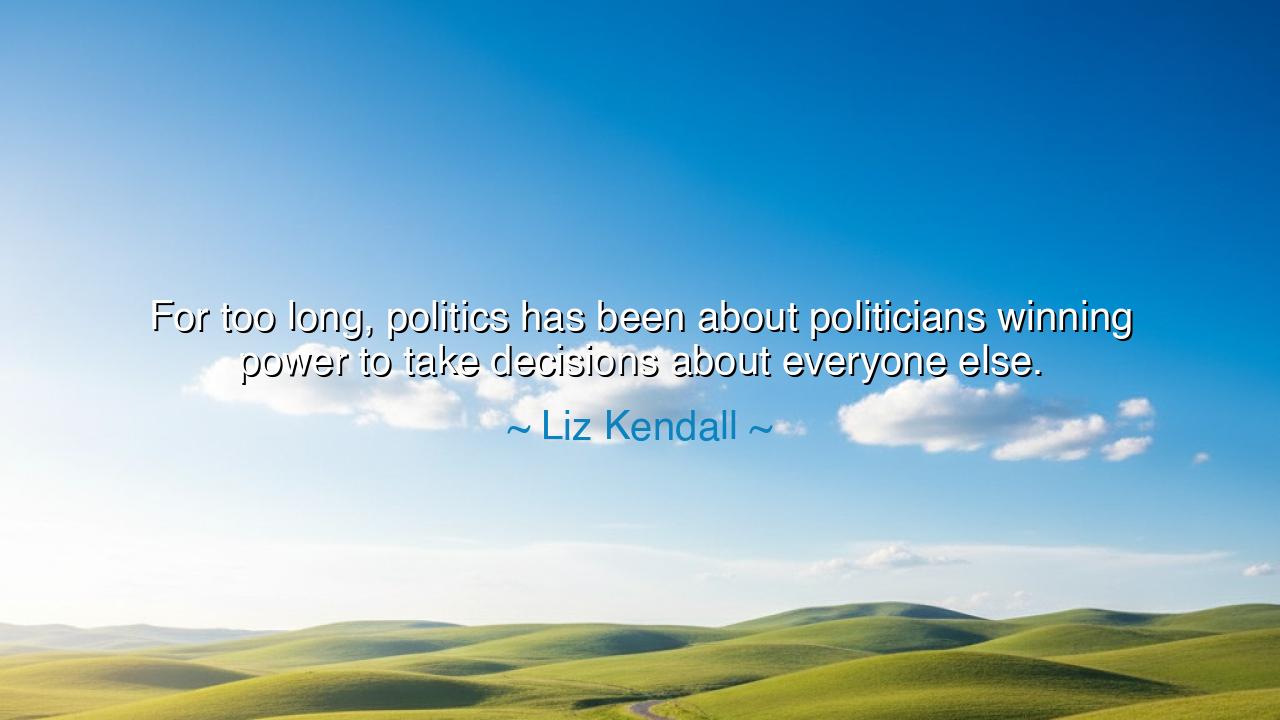
For too long, politics has been about politicians winning power
For too long, politics has been about politicians winning power to take decisions about everyone else.






The words of Liz Kendall, “For too long, politics has been about politicians winning power to take decisions about everyone else,” cry out as both a warning and a summons. They unveil the age-old struggle between ruler and ruled, between the lofty halls of authority and the common ground where the people dwell. Too often, politics becomes a contest not for service but for dominance, where those who ascend to power forget the faces of those who raised them there. Kendall’s voice is a reminder that true governance is not conquest, but stewardship.
The ancients knew this truth well. They warned that a ruler who governs for his own glory ceases to be a shepherd and becomes a tyrant. The power of leadership, if sought merely to command, becomes a sword against the very people it should protect. Yet when power is taken up with humility, it becomes a staff that guides and uplifts. Kendall’s lament is timeless: too often, the stage of politics is filled with actors seeking applause, while the true needs of the people remain unheard.
History provides stark testimony. In Revolutionary France, the kings and nobles ruled as though the nation existed for their pleasure, making decisions that enriched a few while impoverishing the many. At last, the cry of the people rose, demanding that power be returned to those whose sweat and blood sustained the nation. The storming of the Bastille was not only a cry against oppression, but against the arrogance of rulers who believed decisions belonged only to themselves. It was proof that when politics becomes too distant from the people, the people themselves will seize their voice.
Kendall’s words are not despair but a call to renewal. They ask us to remember that power is not a prize to be won, but a trust to be honored. Leaders must not rule as distant lords but walk as companions among those they serve. For when decisions are made with the people, rather than over them, the bonds of society are strengthened, and trust flourishes like a tree rooted deep in good soil.
Let this wisdom pass to future generations: beware of those who crave power for its own sake, for they will see the people only as subjects. Honor instead those who seek to listen, to share, to guide. For the greatness of a nation does not lie in the triumph of its politicians, but in the well-being of its people. And when politics returns to this true purpose, then governance will no longer be a contest of winners and losers, but a covenant of unity and care.






DMVu Duc Minh
Liz Kendall’s statement really made me think about how power dynamics shape our political system. But is it always this black-and-white? There are certainly politicians who genuinely aim to improve lives. At the same time, though, the pressure to win power and hold onto it could compromise their true intentions. How do we strike a balance where politicians win power not to dominate, but to serve and enact real, positive change?
Nnwiih
I’ve often felt that politics revolves around a cycle of power grabs, but this quote makes me question whether we, as citizens, have any real control. Are we too passive? Shouldn’t we demand more than just the right to vote every few years? It feels like the system leaves us at the mercy of those in charge. Is there a way to truly shift the dynamic so that it's about public service, not power consolidation?
KNKhanh Ngan
Reading this, I’m really wondering if the issue of political power is less about the individual politicians and more about the system itself. Why does the political world often feel so disconnected from the lives of everyday citizens? Are politicians merely products of a system that prioritizes winning above everything else? How can we encourage genuine change that empowers people, not just parties?
HNNhu Y Huynh Ngoc
It’s interesting how Liz Kendall is calling out the power struggle in politics. While politicians may win elections and control policies, what about the people they govern? Why is it that citizens often feel like decisions are being made for them without their input? If true democracy is about participation, shouldn't we demand more transparency and accountability from those in power? Could this be the root of widespread political disenchantment?
NBHong Nhung Bui
Isn't this quote a little disheartening? It suggests that politicians are more focused on gaining power rather than actually serving the people. But doesn’t that make me wonder if the entire system is flawed from the start? Maybe politicians should focus more on collaboration and listening to the people they represent. Could it be that the game of politics is more about self-interest than true governance?